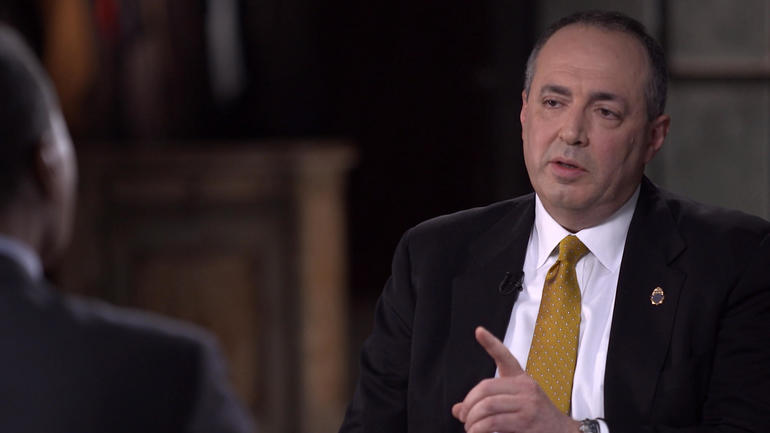 The withdrawal of Tom Marino’s nomination as national drug czar is a reminder of the power of whistle-blowing and aggressive investigative reporting, while the fact that he was named in the first place is a reminder of the hollowness of the Trump’s Administration’s commitments to draining the swamp and to seriously addressing the opioid epidemic.
The withdrawal of Tom Marino’s nomination as national drug czar is a reminder of the power of whistle-blowing and aggressive investigative reporting, while the fact that he was named in the first place is a reminder of the hollowness of the Trump’s Administration’s commitments to draining the swamp and to seriously addressing the opioid epidemic.
Yet there is much more to be done beyond denying a high-profile job to the Congressman who did the pharmaceutical industry’s bidding in weakening the Drug Enforcement Administration’s ability to thwart illicit distribution of prescription painkillers.
The first step, of course, is for Congress to undo the damage caused by Marino’s bill, which Democrats and Republicans alike allowed to be enacted with little scrutiny. Also needed are reforms to the revolving door system, which the excellent reporting by the Washington Post and 60 Minutes and the revelations of DEA whistle-blower Joseph Rannazzisi (photo) showed to play a key role in the story as former DEA officials working for the drug industry or its law firms helped to draft and promote the legislation.
If the scourge of opioids is to end, there will have to be much stronger enforcement of the Controlled Substances Act (CSA), the law that forms the basis of U.S. drug control policy. For a long time, it appeared the problem was that the CSA was being enforced too strictly, at least when it was applied to drug users and low-level drug sellers.
Starting about a decade ago, federal officials and prosecutors began to pay attention to the pernicious role played by the supposedly legitimate drug industry. In 2007, Purdue Pharma’s Purdue Frederick Inc. unit and several of its executives pleaded guilty to criminal charges of misleading the public about the addictive nature of its OxyContin pain medication and paid more than $634 million in penalties. That case was brought by the office of the U.S. Attorney for the Western District of Virginia in cooperation with the Food and Drug Administration, not the DEA.
During the following years, the DEA began to bring its own enforcement actions under the CSA or referred cases to the Justice Department for prosecution. According to data I have collected for Violation Tracker (some of which has not yet been posted on the site), there have been about 80 CSA actions against drug companies, distributors or healthcare providers since 2008.
The penalties collected in the cases total about $605 million. The biggest amounts were imposed on the distributor McKesson ($176 million in three cases); CVS ($130 million in nine cases); Walgreens ($80 million); and a second big distributor, Cardinal Health ($68 million in three cases).
It’s notable that the penalties in these 80 cases combined amount to less than that imposed on Purdue alone. Moreover, all of the cases were brought as civil rather than criminal actions. I found one corporate CSA criminal cases but it was not brought against a healthcare company or retailer but rather against United Parcel Service, in connection with its role in delivering shipments from illegal online pharmacies. And in that case UPS was offered a non-prosecution agreement that essentially nullified the criminal charge.
Given the size of the industry and the profitability of the companies involved, all these cases amounted to little more than a slap on the wrist. The gravity of the opioid crisis requires stronger action against the companies involved, as well as their executives and, in cases like the Sackler Family behind Purdue Pharma, their individual owners.
 Given his own string of business controversies, it perhaps should come as no surprise that Donald Trump does not seem to worry much about the accountability track record of the companies from which he has recruited key members of his administration.
Given his own string of business controversies, it perhaps should come as no surprise that Donald Trump does not seem to worry much about the accountability track record of the companies from which he has recruited key members of his administration. It took a spill of tens of millions of gallons of water contaminated with toxic coal ash into a river used as a source of drinking water to put a halt to what was starting to look like a corporate coup in North Carolina. Duke Energy, the owner of the retired Dan River power plant in the town of Eden where the accident took place in early February, is now under siege, as is the governor who was doing its bidding.
It took a spill of tens of millions of gallons of water contaminated with toxic coal ash into a river used as a source of drinking water to put a halt to what was starting to look like a corporate coup in North Carolina. Duke Energy, the owner of the retired Dan River power plant in the town of Eden where the accident took place in early February, is now under siege, as is the governor who was doing its bidding. The movement of federal officials through the revolving door into lucrative private-sector positions is a well-known story, but a
The movement of federal officials through the revolving door into lucrative private-sector positions is a well-known story, but a
You must be logged in to post a comment.